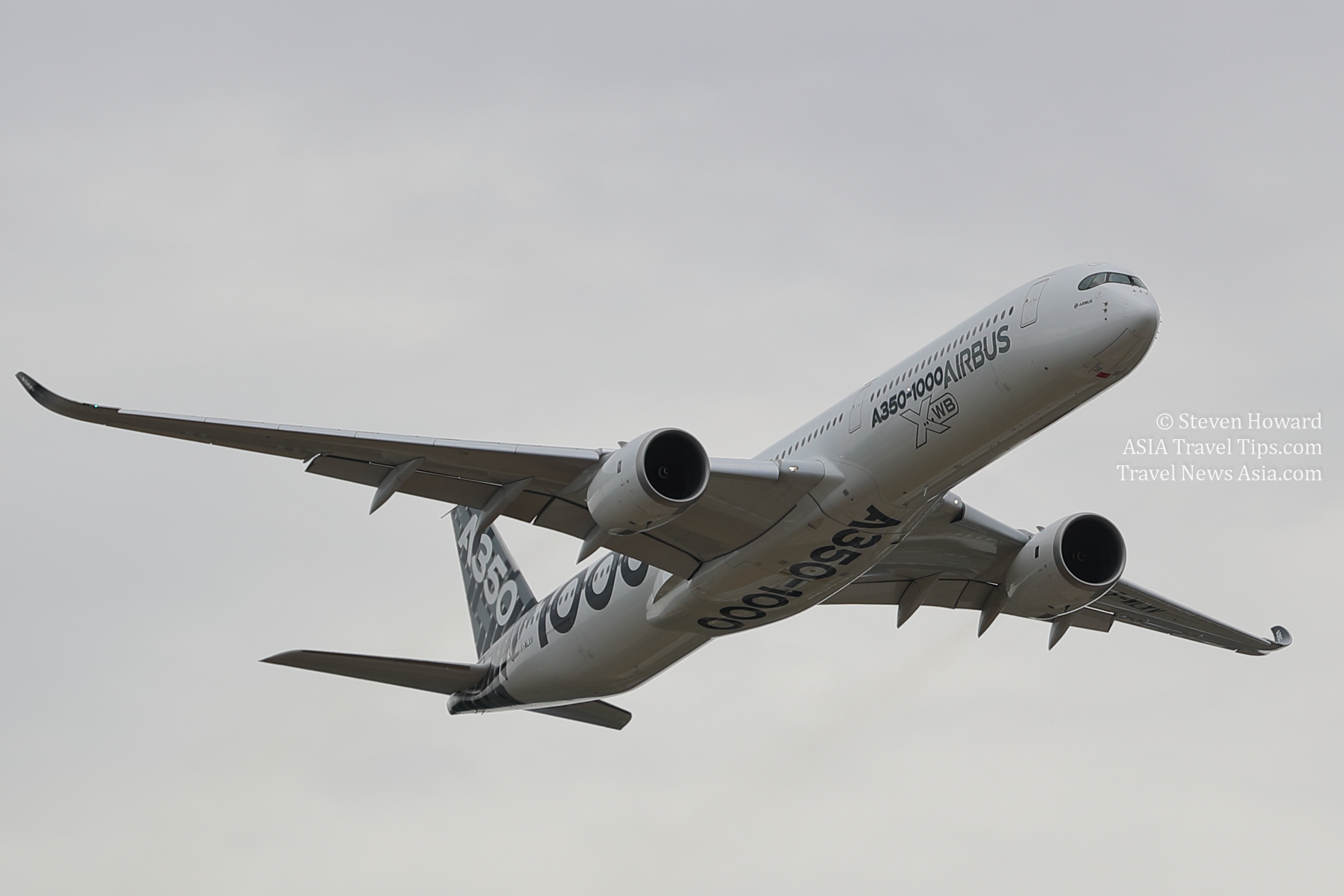|
Airbus has reported consolidated financial results
for H1 ended 30 June 2020.
Net commercial aircraft orders totalled 298 (H1
2019: 88 aircraft), including 8 aircraft in Q2, with the order
backlog comprising 7,584 commercial aircraft as of 30 June 2020.
Airbus Helicopters booked 75 net orders (H1
2019: 123 units), including 3 H145s, 1 Super Puma and 1 H160
during the second quarter alone.
Airbus Defence and Space�s order intake increased
to � 5.6 billion.
�The impact of the COVID19 pandemic on our
financials is now very visible in the second quarter, with H1
commercial aircraft deliveries halving compared to a year ago,�
said Airbus Chief Executive Officer Guillaume Faury. �We have
calibrated the business to face the new market environment on an
industrial basis and the supply chain is now working in line with
the new plan. It is our ambition to not consume cash before M&A
and customer financing in H2 2020. We face a difficult situation
with uncertainty ahead, but with the decisions we have taken, we
believe we are adequately positioned to navigate these challenging
times in our industry.�

Consolidated revenues decreased to � 18.9 billion
(H1 2019: � 30.9 billion), driven by the difficult market
environment impacting the commercial aircraft business with around
50% fewer deliveries year-on-year. This was partly offset by more
favourable foreign exchange rates.
A total of 196 commercial
aircraft were delivered (H1 2019: 389 aircraft), comprising 11
A220s, 157 A320 Family, 5 A330s and 23 A350s. Airbus Helicopters
reported stable revenues, reflecting lower deliveries of 104 units
(H1 2019: 143 units) partially compensated by higher services.
Revenues at Airbus Defence and Space were impacted by lower volume
and mix, in particular at Space Systems, as well as delays in some programmes caused by the COVID19 situation.
Consolidated EBIT Adjusted � an alternative
performance measure and key indicator capturing the underlying
business margin by excluding material charges or profits caused by
movements in provisions related to programmes, restructuring or
foreign exchange impacts as well as capital gains/losses from the
disposal and acquisition of businesses � totalled � -945 million
(H1 2019: � 2,529 million).
Airbus� EBIT Adjusted of � -1,307 million (H1
2019: � 2,193 million) mainly reflected the reduced commercial
aircraft deliveries and lower cost efficiency. Steps have been
taken to adapt the cost structure to the new levels of production,
the benefits of which are materialising as the plan is executed.
Also included in the EBIT Adjusted is � -0.9 billion of COVID19
related charges.
Commercial aircraft are now being produced at
rates in accordance with the new production plan announced in
April 2020, in response to the COVID19 situation. The current
market situation has led to a slight adjustment in the A350 rate
from 6 to 5 aircraft a month for now. On the A220, the Final
Assembly Line (FAL) in Mirabel, Canada, is expected to
progressively return to pre-COVID levels at rate 4 while the new
FAL in Mobile, US, opened as planned in May. At the end of June,
around 145 commercial aircraft could not be delivered due to
COVID19.
Airbus Helicopters� EBIT Adjusted increased to �
152 million (H1 2019: � 125 million), reflecting a favourable mix,
mainly in military, and higher services partially offset by the
lower deliveries. The five-bladed H145 and H160 helicopters were
recently certified by the EASA.
EBIT Adjusted at Airbus Defence and Space
decreased to � 186 million (H1 2019: � 233 million), reflecting
the COVID19 impact, mainly in Space Systems, partly offset by cost
reduction measures. The division�s restructuring plan was updated
to also reflect the impact of the coronavirus pandemic.
Three A400M transport aircraft were delivered in
H1 2020. The certification of automatic low-level flight
capability and simultaneous paratrooper dispatch were achieved in
H1 2020, marking major milestones towards the aircraft�s full
development. A400M retrofit activities are progressing in close
alignment with customers.
Consolidated self-financed R&D expenses totalled �
1,396 million (H1 2019: � 1,423 million).
Consolidated EBIT (reported) was � -1,559 million
(H1 2019: � 2,093 million), including Adjustments totalling a net
� -614 million. These Adjustments comprised:
* � -332 million related to A380 programme cost,
of which � -299 million was in Q2;
* � -165 million related to the dollar
pre-delivery payment mismatch and balance sheet valuation, of
which � -31 million was in Q2;
* � -117 million of other costs, including
compliance, of which � -82 million was in Q2.
The consolidated reported loss per share of �
-2.45 (H1 2019 earnings per share: � 1.54) includes the financial
result of � -429 million (H1 2019: � -215 million). The financial
result reflects a net � -212 million related to Dassault Aviation
as well as the impairment of a loan to OneWeb, recorded in Q1 2020
for an amount of � -136 million. The consolidated net loss was
� -1,919 million (H1 2019 net income: � 1,197 million).
Consolidated free cash flow before M&A and
customer financing amounted to � -12,440 million (H1 2019: �
-3,981 million) of which � -4.4 billion was in Q2. The
corresponding figure for Q1 2020 excluding the penalty payments -
related to January�s compliance settlement with the authorities -
was also at � -4.4 billion, demonstrating that cash containment
measures including the adjustment of incoming supply started to
become effective. These measures partially compensated for the
reduced cash inflow from the low number of commercial aircraft
deliveries in Q2.
Capital expenditure in H1 was stable year-on-year
at around � 0.9 billion with Full-Year 2020 capex still expected
to be around � 1.9 billion. Consolidated free cash flow was �
-12,876 million (H1 2019: � -4,116 million). The consolidated net
debt position was � -586 million on 30 June 2020 (year-end 2019
net cash position: � 12.5 billion) with a gross cash position of �
17.5 billion (year-end 2019: � 22.7 billion).
The company�s Full-Year 2020 guidance was
withdrawn in March. The impact of COVID19 on the business
continues to be assessed and given the limited visibility, in
particular with respect to the delivery situation, no new guidance
is issued.
Other Matters
In the frame of COVID19, discussions are
progressing with social partners. A restructuring provision is
expected to be recognised once the necessary conditions are
fulfilled. The amount is expected to be between � 1.2 billion and
� 1.6 billion.
The UK Serious Fraud Office (SFO) has
requisitioned GPT Special Project Management Ltd (GPT) to appear
in court for prosecution on a single corruption-related charge.
GPT is a UK company that operated in Saudi Arabia which was
acquired by Airbus in 2007 and ceased operations in April 2020.
The SFO�s investigation related to contractual arrangements
originating prior to GPT�s acquisition and continuing thereafter.
A resolution of GPT, whatever its form, will not affect the 31
January 2020 UK Deferred Prosecution Agreement and a value has
been provisioned in the Airbus accounts.
On 24 July 2020, the Company announced it had
agreed with the governments of France and Spain to make amendments
to the A350 Repayable Launch Investment (RLI) contracts to end the
long-standing World Trade Organisation (WTO) dispute and remove
any justification for US tariffs. After 16 years of litigation at
the WTO, this final step removes the last contentious point by
amending the French and Spanish contracts to what the WTO
considers the appropriate interest rate and risk assessment
benchmarks.
See also:
Airports, Air Travel and COVID19 - Exclusive Interview with
SITA's President of Asia Pacific, Sumesh Patel
and
Emerging Travel Trends in Asia Pacific - Interview with Two
Senior Executives at Sabre.
See latest
Travel News,
Video
Interviews,
Podcasts
and other
news regarding:
COVID19,
Airbus.
|
Headlines: |
|
|
